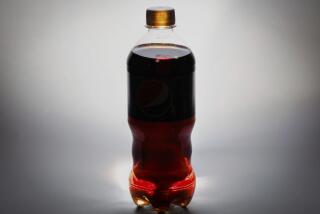Life Is Sweet for Dieters as FDA OKs New Sugar Substitute
WASHINGTON — The Food and Drug Administration on Wednesday approved the first major new artificial sweetener in a decade--a sugar substitute made from sugar but 600 times sweeter and without calories.
Sucralose, which will be available in stores within the next few months, was approved for widespread use--from a plain table-top sugar substitute to an additive in food products ranging from sodas to sauces.
It is manufactured by McNeil Specialty Products, a subsidiary of Johnson & Johnson, of New Brunswick, N.J.
“This represents a new option for American consumers who wish to use an artificial sweetener,” said Dr. Michael Friedman, the FDA’s lead deputy commissioner. “They now have another choice.”
Americans, who are constantly seeking short-cuts to weight control, are expected to embrace the product, as they traditionally have with other sugar substitutes. Artificial sweeteners constitute a $1-billion-a-year market, according to the Calorie Control Council, the Atlanta-based trade association for the diet food industry.
Sucralose will be the fourth in a line of low- or no-calorie sweeteners regarded as “intense,” that is, many times sweeter than sugar.
Saccharine, the oldest sugar substitute on the market, has been sold commercially since 1900, predating the existence of the FDA. The current market leader, aspartame, known as NutraSweet, was approved by the FDA in 1981 for limited use and received the nod for widespread use in 1983. A third sweetener, acesulfame potassium, was licensed in 1988 for limited uses.
The new product is being touted as one that is easily dissolved and can be used in cooking. It has a long shelf life and, unlike saccharine, no aftertaste. Unlike with saccharine and aspartame, a warning about potential health problems will not have to be printed on sucralose packages.
Saccharine, after years of consumer use, was determined to be a weak carcinogen, causing bladder cancer in rats. As a result, the FDA attempted to ban it in 1977, but Congress--responding to a storm of public protest over its loss--blocked the agency from doing so. Instead, products containing saccharine must now carry a label warning of its possible cancer-causing properties.
Aspartame also carries a warning. It should not be used by individuals born with a rare genetic disease called phenylketonuria, or PKU, which afflicts one in 14,000 people and which, if untreated, can cause retardation. Sufferers must avoid a substance called phenylalanine, which is an ingredient in aspartame.
George Pauli, director of the FDA’s division of product policy, said sucralose “has passed every safety test” in animals and is regarded as safe for human consumption. The agency said it reviewed data from more than 110 animal and human studies.
But at least one animal study, conducted on rats and involving high dosages, showed that the product caused shrinkage of the thymus gland, a part of the immune system, although no harmful health consequences appeared to result.
Pauli said the “no effect” level in animals--that is, the dosage at which no adverse side effects could be found--was, in fact, “100 times higher than what people would consume.”
Nevertheless, Michael Jacobson, executive director of the Center for Science in the Public Interest, a consumer group, said he would have preferred that the product be licensed for more restricted uses and disallowed in soft drinks.
“We have some concerns,” he said. “This effect might be entirely benign.”
The new sweetener, already in widespread international use, is made from sugar using a special process that uses chlorine to change the molecule so that it simply passes through the body without being metabolized.
Sucralose “has no calories and doesn’t promote tooth decay,” said McNeil general manager Neil Polo. “Sucralose allows food and beverage companies to create a broader range of great-tasting products without the calories of sugar.”
A teaspoon of sugar contains about 15 calories.
Most experts repeatedly have stressed that diet foods are not a panacea for weight loss and that Americans seeking to shed pounds should reduce both calories and fat, as well as increase their levels of physical activity.
Citing Department of Agriculture figures, the Jacobson group said obesity has skyrocketed in this country during the last 20 years and so has the consumption of both sugar and sugar substitutes, while fat intake has remained relatively level.
An estimated 58 million Americans are overweight, and obesity is believed to contribute to 300,000 deaths annually, according to the FDA.
The diet food industry, which has been eagerly awaiting the introduction of more powerful and palatable artificial, low-calorie sweeteners, welcomed the FDA approval.
“Our national consumer survey shows that the majority of Americans want more product choices in low-calorie, sugar-free foods and beverages,” said Lyn O’Brien Nabors, executive vice president of the Calorie Control Council. “Sucralose will be a valuable sweetener to help meet that consumer demand.”
*
Times staff writer Greg Johnson in Los Angeles contributed to this story.





